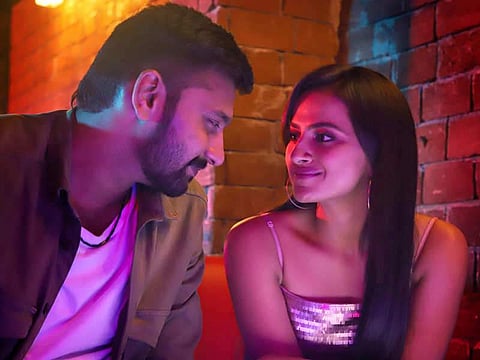K-13 Review: A well-executed drama let down by loose ends
Rating:(2 / 5)
If you are asked to curate a conversation between two strangers from different walks of life, who would you choose? Though choosing people from completely contrasting professions sounds tempting, a more interesting outcome is sure to result if the people in question have at least one major similarity. For instance, a nurse and a teacher could talk about selflessness. An advocate and an activist, on the other hand, might talk about justice. What if a filmmaker/screenwriter meets an author? What would they bond over? In Barath Neelakantan's K-13, Arulnithi plays the former and Shraddha Srinath the latter, and when the duo meet at a pub, they talk about writer's block--a topic not touched on much in our cinema. This meeting is followed by a mysterious death. Sounds interesting, right? The way the debutant filmmaker sets up the stage for his psychological drama is indeed interesting, but the way events unfold on screen is, unfortunately, uninspiring.
Director: Barath Neelakantan
Cast: Arulnithi, Shraddha Srinath
These events take place mostly within the confines of one flat (as you may have guessed from the title), and cinematographer Aravinnd Singh does an impressive job of making us feel claustrophobic, scared, and sick when needed. The storyboards used for the film are shown to us in the end credits, and the amount of hardwork the team has invested is reflected in every single shot. The sound designers of the film deserve special mention for recreating even minute sounds like the ruffling of duct tape and a football bouncing afar. I also particularly liked the way the title of Malarvizhi's novel, Kaatchi Pizhai, is used to foreshadow the central theme of the film.
A few minutes into the film, it becomes evident that pretty much the entire star cast featured in the posters and promos--Yogi Babu, Madhumitha and Gayathrie--have only extended cameos, and the story is only about the two leads, played by Arulnithi and Shraddha. The former seems comfortable as he returns to the familiar single-room drama territory, post Demonte Colony. Shraddha, on the other hand, fits beautifully in the role of the hyper-introverted writer, Malarvizhi, who is suffering from guilt.
Generally, the kind of questions that arise within the audience while watching a thriller determine the effect it has on them. Instead of the 'what' and 'who' questions, K-13 leaves us puzzled by the 'whys' and 'why nots', on account of choices made by protagonist Mathiazhagan. Even taking into consideration the fact that he is in trauma, triggered by the death of a character, him being unable to make the simplest of decisions, seeing him roam around in blood-soaked clothes without even thinking about changing out of them, and not making any attempts to leave the unlocked house much earlier when he had the chance to, does feel odd. Several other questions about the plot, which we expect to be answered at some point in the second half, are left hanging as loose ends.
Then again, if the final reveal works for you, it's the sort of the film that could work big time. It might even make you forget the aforementioned imperfections. But sadly, I saw this reveal coming from a distance, and so, it didn't quite have an impact on me.
In a particular exchange between Mathi and Malar, the former firmly insists that he wants to write his own script and doesn't want to direct a story written by someone else. If Mathi had realised that filmmaking is a collective effort and a good director doesn't need to write his own script, much of the unfortunate events in this film could have been avoided. The same perhaps, can be said about the director of this film too.

